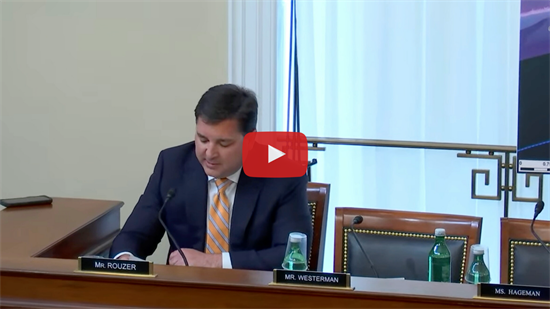Press Releases
Rouzer Speaks on Wrightsville Beach Renourishment Bill at House Natural Resources Committee
Washington,
May 10, 2023
WASHINGTON, DC - Today, Congressman David Rouzer (NC-07) delivered remarks in support of his legislation, H.R. 524, during the House Natural Resources Subcommittee on Water, Wildlife and Fisheries legislative hearing. H.R. 524 would reverse the Biden Administration’s decision prohibiting Wrightsville Beach from using their traditional borrow site for beach renourishment, thus allowing them to return to a regular, ecologically friendly, renourishment schedule. Doing so is imperative to the community’s physical resiliency against future storms, a healthy ecosystem, and economic safety. Congressman Rouzer also welcomed Wrightsville Beach Mayor Darryl Mills who provided testimony in support of H.R. 524. Click here to watch Mayor Mills' testimony.
Click here or on the image above to watch Rep. Rouzer's remarks. Full remarks: “I appreciate the opportunity to highlight the importance of H.R. 524 to amend the Coastal Barrier Resources Act to create an exemption for certain shoreline borrow sites. Now Wrightsville Beach, which is in my district, serves as one of North Carolina's most popular beaches – hosting visitors from all across the country and driving significant job growth and economic activity for our local communities. We also count on a strong robust coastline as the first line of defense against powerful storms and it's worked by limiting the amount of flooding and damage inflicted. Now for years, the process of replacing the sand on Wrightsville Beach, or beach renourishment as we say, has worked exceptionally well from all perspectives. As we all know, most beaches naturally erode over time. In the case of Wrightsville Beach, when the sand is added to the shore it solidifies the dunes and berms while protecting the property behind it. Over time, the sediment, guided by the current, deposits sand from the beach to Masonboro Inlet just to the South.” […] “So, every four years, the U.S Army Corps of Engineers dredges the inlet that you're looking at right there of its extra sand and returns it to Wrightsville Beach. Now for decades, for more than 50 years in fact, Masonboro Inlet has served as a reliable, ecologically friendly borrow site for Wrightsville Beach. Now as you know, CBRA zones were established by the Coastal Barrier Resources Act of 1982. This law prohibits the federal government from direct or indirect investment in these zones as established by the U.S Fish and Wildlife Service. The Masonboro Inlet exists within that coastal barrier resource system unit l09, the 50 plus year borrowing source for Wrightsville Beach, which you can see on the map. With enactment of the Coastal Barrier Resources Act, an exemption was later made administratively to permit Wrightsville Beach to continue to use this borrow site. The Corps made permanent this exemption in 1998. “Now in 2019, this issue came up for review and then [interior] Secretary David Bernhardt reaffirmed this exemption. However, the Biden Administration later reversed it, with the effect of prohibiting sand from being used from its traditional source despite the decades of precedent. Now as it currently stands, Wrightsville Beach is long past its due date for much needed renourishment. Seasonal storms have caused flooding to occur more quickly and more easily than in the past. In fact, if Wrightsville Beach experiences one more major storm the devastation to property could be catastrophic, costing taxpayers as well as the National Flood Insurance Program significantly more. “And as you can see from the picture behind me, if you could show this escarpment photo … you can see how much the sand has eroded. It’s quite remarkable. … The point there is, there's a tremendous amount of sand that has been lost and the only option left is to use an offshore borrow site, but this will only disrupt the natural flow of sediment deposit, disturb the current ecosystem, and cost significantly more. “Furthermore, Masonboro Inlet is going to continue to be dredged for navigational purposes, so it makes no sense not to use that sand for its traditional purpose of renourishing Wrightsville Beach. Now ironically, the offshore site identified for the beach has been found to have thousands and thousands of tires interlinked, interlinked now, by rusty old chains that the Fish and Wildlife Service put out in the 1970s to try to create a fish estuary. Imagine that. “Filtering through tires and other debris to provide sand for renourishment obviously creates its own set of problems. So, H.R. 524, long and the short of it is, it fixes this problem in a very commonsense fashion by creating the exemption making that permanent which has been practiced for 50 plus years. It saves taxpayer dollars. It does not disrupt the ecological environment, which by the way, the birds love it there at Masonboro Inlet. We’ve got an ecological system that works really well. There's no need to disturb it. Mr. Chairman, additionally, I have 11 local officials and entities that have sent letters of support or have passed resolutions of support for this bill. I ask unanimous consent to have those inserted for the record.” |



